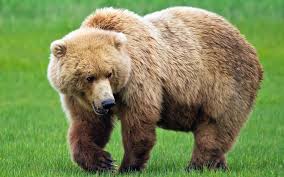记忆方法
1. bear => fer- "carry, bear".
中文词源
bear 承受,熊
1.承受,来自PIE *bher(1), 承受,带来,生育,同bring.
2.熊,来自PIE *bher(2), 明亮的,棕色的。指棕熊。
bear 熊起源于黑海和里海北岸之间的原始印欧人看不到北极熊和黑熊,他们所能看见的是“棕”熊。这个单词与brown n.棕色,以及beaver ['biːvə] n.海狸;海狸皮毛有关。拉丁语借用了这些概念后,将棕色头发或棕色皮肤(较白皮肤颜色深)的女人称为brunette [bruː'net] n.浅黑肤色的女人。
英语词源
- bear
-
bear: [OE] The two English words bear ‘carry’ and bear the animal come from completely different sources. The verb, Old English beran, goes back via Germanic *ber- to Indo-European *bher-, which already contained the two central meaning elements that have remained with its offspring ever since, ‘carry’ and ‘give birth’. It is the source of a very large number of words in the Indo-European languages, including both Germanic (German gebären ‘give birth’, Swedish börd ‘birth’) and non-Germanic (Latin ferre and Greek phérein ‘bear’, source of English fertile and amphora [17], and Russian brat ‘seize’).
And a very large number of other English words are related to it: on the ‘carrying’ side, barrow, berth, bier, burden, and possibly brim; and on the ‘giving birth’ side, birth itself and bairn ‘child’ [16]. Borne and born come from boren, the Old English past participle of bear; the distinction in usage between the two (borne for ‘carried’, born for ‘given birth’) arose in the early 17th century.
Etymologically, the bear is a ‘brown animal’. Old English bera came from West Germanic *bero (whence also German bär and Dutch beer), which may in turn go back to Indo- European *bheros, related to English brown. The poetic name for the bear, bruin [17], follows the same semantic pattern (it comes from Dutch bruin ‘brown’), and beaver means etymologically ‘brown animal’ too.
=> amphora, bairn, barrow, berth, bier, born, burden, fertile, fortune, paraphernalia, suffer; brown - bear (v.)
- Old English beran "to bear, bring; bring forth, produce; to endure, sustain; to wear" (class IV strong verb; past tense bær, past participle boren), from Proto-Germanic *beran (cognates: Old Saxon beran, Old Frisian bera, Old High German beran, German gebären, Old Norse bera, Gothic bairan "to carry, bear, give birth to"), from PIE root *bher- (1) meaning both "give birth" (though only English and German strongly retain this sense, and Russian has beremennaya "pregnant") and "carry a burden, bring" (see infer).
Ball bearings "bear" the friction. Many senses are from notion of "move onward by pressure." Old English past tense bær became Middle English bare; alternative bore began to appear c. 1400, but bare remained the literary form till after 1600. Past participle distinction of borne for "carried" and born for "given birth" is from late 18c. To bear (something) in mind is from 1530s. - bear (n.)
- Old English bera "bear," from Proto-Germanic *beron, literally "the brown (one)" (cognates: Old Norse björn, Middle Dutch bere, Dutch beer, Old High German bero, German Bär), from PIE *bher- (3) "bright, brown" (see brown (adj.)).
Greek arktos and Latin ursus retain the PIE root word for "bear" (*rtko; see Arctic), but it is believed to have been ritually replaced in the northern branches because of hunters' taboo on names of wild animals (compare the Irish equivalent "the good calf," Welsh "honey-p
权威例句
- 1. Eleanor's work among the women will, I trust, bear fruit.
- 我相信埃莉诺所做的工作会在妇女中有所成效。
- 2. The developing countries bear the burden of an enormous external debt.
- 发展中国家背负着巨额外债。
- 3. I can't bear people who make judgements and label me.
- 我讨厌人们对我品头论足。
- 4. I couldn't bear to see my reflection in the mirror.
- 我不忍看镜子里自己的样子。
- 5. The bear exposed its teeth in a muffled growl.
- 那只熊龇出牙齿,发出一声低沉的吼叫。

